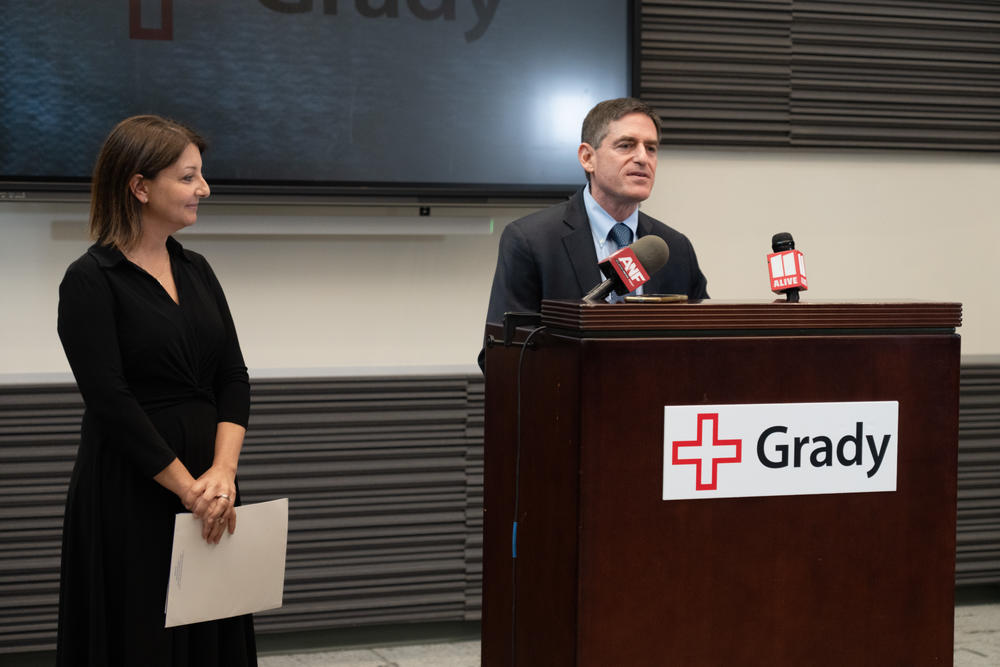
Caption
CDC Director Dr. Mandy Cohen and Jonathan Mermin helped present the new guidelines at Grady's HIV/AIDS treatment center in Atlanta on June 5, 2024.
Credit: CDC
LISTEN: When taken up to three days after having sex, the antibiotic doxycycline has been shown to prevent syphilis, gonorrhea and chlamydia in about two-thirds of users. GPB's Sofi Gratas reports.

CDC Director Dr. Mandy Cohen and Jonathan Mermin helped present the new guidelines at Grady's HIV/AIDS treatment center in Atlanta on June 5, 2024.
The Atlanta-based Centers for Disease Control and Prevention presented new guidelines last week on medication to prevent sexually transmitted infections.
When taken up to three days after having sex, the antibiotic doxycycline has been shown to prevent syphilis, gonorrhea and chlamydia in about two-thirds of users, according to a series of clinical trials cited in the CDC’s new guidance.
That guidance includes a recommended dosage of 200mg post exposure with a focused recommendation for transgender women and gay and bisexual men. But Jonathan Mermin with the CDC said there are ongoing trials in other groups.
“If patients and clinicians through shared decision making do decide to use doxy PEP for other populations, we would recommend following the same guidance,” said Mermin, director of the National Center for HIV, Viral Hepatitis, STD, and TB Prevention.
Doxy PEP — not to be confused with post-exposure prophylaxis for HIV — should be used intermittently based on need. Luckily, Mermin said the antibiotic is already widely available. Now, it’s just about prescribing it.
“Doxy PEP represents the first new STI prevention tool in decades,” Mermin said. “We hope that providing the guidelines from CDC will inspire both health departments and clinicians to start using it.”
According to the most recent data available, Georgia ranks among the top 20 states for syphilis prevalence, and top five states for chlamydia and gonorrhea. Rising rates of syphilis in the state, including congenital syphilis, are part of nationwide trends.
Though doxycycline is a regularly prescribed antibiotic, some health care providers may not be familiar with Doxy PEP, because the studies referenced in the new guidelines are only a couple of years old.
Yet, another barrier may be stigma, still pervasive around sexual health care.
“STI’s do continue to be stigmatized,” Mermin said. “And this stigma can bury the truth that all people deserve quality sexual health care in order to live healthy lives.”
Jodie Guest, epidemiology professor at Emory University’s Rollins School of Public Health, said education around Doxy PEP is essential to its rollout.
And it’s not just up to providers to educate themselves.
“There's an advocacy piece to this guideline,” Guest said. “It is meant to give patients the ability to ask for this.”
Especially since sexual health care isn’t offered to everyone equally, she said.
“What we know is that sexual health offerings in the city of Atlanta typically are more robust than they are in our rural communities, and that is an incredibly unfortunate thing that is not unusual for the state of Georgia,” Guest said.
The Fulton County Health Department already provides Doxy PEP. There are also companies that make it available through telehealth.
Before it becomes formally available elsewhere, spokesperson for the Department of Public Health, Nancy Nydam, said they're reviewing the new guidance to implement Doxy PEP into their own prevention practices.
For now, STD testing is available across Georgia’s county health departments while HIV/AIDS treatment can be found in the state's Ryan White clinics.